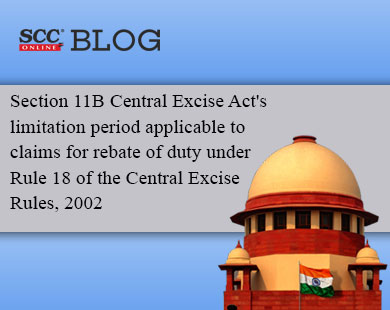Supreme Court: The bench of MR Shah* and MM Sundresh, JJ has held that while making claim for rebate of duty under Rule 18 of the Central Excise Rules, 2002, the period of limitation prescribed under Section 11B of the Central Excise Act, 1944 shall have to be applied and applicable.
It was argued before the Court that as in Rule 18 of the 2002 Rules and notification dated 6.9.2004, there is no mention to the applicability of Section 11B of the Act and that the claim for rebate of duty under Rule 18 is different and distinct than that of the claim for refund of duty under Section 11B of the Act, the period of limitation prescribed under Section 11B of the Act shall not be applicable, while considering the claim for rebate of duty under Rule 18 of the 2002 Rules.
The Supreme Court rejected the said contention to hold that,
“Merely because in Rule 18 of the 2002 Rules, which is an enabling provision for grant of rebate of duty, there is no reference to Section 11B of the Act and/or in the notification dated 6.9.2004 issued in exercise of powers conferred by Rule 18, there is no reference to the applicability of Section 11B of the Act, it cannot be said that the provision contained in the parent statute, namely, Section 11B of the Act shall not be applicable, which otherwise shall be applicable in respect of the claim of rebate of duty.”
After going through the scheme of Section 11B of the Act, the Court observed that the same is applicable with respect to claim for rebate of duty also. The Court noticed that,
- As per Explanation (A) to Section 11B, “refund” includes “rebate of duty” of excise.
- As per Section 11B(1) of the Act, any person claiming refund of any duty of excise (including the rebate of duty as defined in Explanation (A) to Section 11B of the Act) has to make an application for refund of such duty to the appropriate authority before the expiry of one year from the relevant date and only in the form and manner as may be prescribed.
- The “relevant date” is defined under Explanation (B) to Section 11B of the Act, which means in the case of goods exported out of India where a refund of excise duty paid is available in respect of the goods themselves or, as the case may be, the excisable materials used in the manufacture of goods. Thus, the “relevant date” is relatable to the goods exported.
It was, hence, observed that the application for rebate of duty shall be governed by Section 11B of the Act and therefore shall have to be made before the expiry of one year from the “relevant date” and in such form and manner as may be prescribed. The form and manner are prescribed in the notification dated 6.9.2004.
The Court also highlighted the aspect that Section 11B of the Act is a substantive provision in the parent statute and Rule 18 of the 2002 Rules and notification dated 6.9.2004 can be said to be a subordinate legislation and that a subordinate legislation cannot override the parent statute. Subordinate legislation can always be in aid of the parent statute.
Stating that subordinate legislation cannot be interpreted in such a manner that parent statute may become otiose or nugatory, the Court observed,
“If the submission on behalf of the appellant that as there is no mention/reference to Section 11B of the Act either in Rule 18 or in the notification dated 6.9.2004 and therefore the period of limitation prescribed under Section 11B of the Act shall not be applicable with respect to claim for rebate of duty is accepted, in that case, the substantive provision – Section 11B of the Act would become otiose, redundant and/or nugatory.”
The Court held that accepting appellant’s submission would mean that there shall not be any period of limitation for making an application for rebate of duty. On the submission that in such a case the claim has to be made within a reasonable time, the Court said that the same also cannot be accepted as when the statute specifically prescribes the period of limitation, it has to be adhered to.
[Sansera Engineering Limited v. Deputy Commissioner, Large Tax Payer Unit, Bengaluru, 2022 SCC OnLine SC 1635, decided on 29.11.2022]
*Judgment by: Justice MR Shah
For appellant: Sr. Adv Arvind P. Datar
For Revenue: Adv Siddhant Kohli






